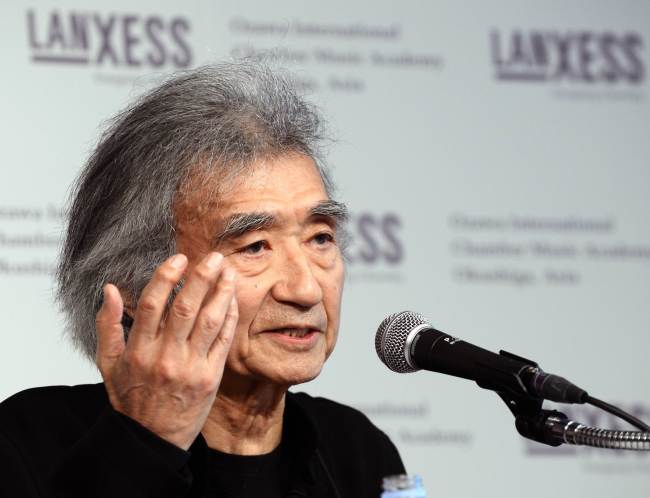TOKYO (AFP) ― More than fifty years ago, a wiry young musician from a humble family slung his guitar on his back and boarded a cargo ship in Japan.
Seiji Ozawa had pestered companies all over the country for sponsorship that would fund his voyage to Europe and help fulfil his dream of learning classical music in the place of its birth.
Only one firm ― Fuji Heavy Industries ― was prepared to take a gamble on this precociously talented young man, supplying a moped to help him get around the continent.
There was one condition: he had to fly a Japanese flag on the back of the bike wherever he went and do his part to promote a country whose economy was roaring into post-war life.
After two months at sea, the ship docked in Marseille, disgorging Ozawa, his guitar, the scooter and the flag. It was the start of what would become a celebrated globe-spanning career as a conductor.
In France he met Charles Munch ― whom he called “Le Beau Charles” or “Handsome Charles” ― a French conductor who was music director of the Boston Symphony Orchestra and the man who would become his mentor.
Ozawa first saw Munch at a 1959 international conducting competition in Besancon in the east of France.
 |
Japanese conductor Seiji Ozawa speaks during a press conference in Tokyo on April 3. (AFP-Yonhap News) |
“They gave me the prize,” said Ozawa, speaking fluent English during an interview at the French ambassador’s residence in Tokyo.
Ozawa’s victory brought him attention, but he said that witnessing Munch conduct left a profound impression.
“(It was) fantastic. The flavour, when he smiled. He was usually like this,” he said, adopting the heavy frown that Munch was known for.
“But when he smiled a little bit, the orchestra’s sound was completely different. When I saw it, I went absolutely gaga.”
More than a decade later, Ozawa would step into Munch’s shoes at Boston, an orchestra he led for 29 years until 2002.
Ozawa speaks with reverence of Herbert von Karajan, the principal conductor of the Berlin Philharmonic, who towered over the world of classical music in the latter half of the 20th century.
“Mr Maestro von Karajan invited me every year” as a guest conductor, he recalled. At the time “there was no Asian conductor, so I think he was worried about me.”
Karajan demanded that his young prodigy devise the programme he wanted to conduct directly with him, and without talking to the orchestra’s managers ― something almost unheard of for a guest conductor.
“I would make my programme every year (with Karajan) until he died,” Ozawa said. “I think he was worried because I am from the Orient, an Asian with no tradition. I may go for a crazy programme,” he said, bursting into peels of laughter.
The roll call of orchestras over his career is impressive: New York Philharmonic (with Leonard Bernstein), Toronto Symphony Orchestra, San Francisco Symphony Orchestra and of course, Boston Symphony Orchestra and eight years at the helm of the Vienna State Opera.
“God gave us this kind of music ... I want to work with an orchestra,” he said. “Not having the taste of this with an orchestra could be difficult for me.”
But in 2010 Ozawa was felled by cancer of the oesophagus and underwent surgery. A brief comeback later that year was put on ice and in 2011 he was treated for a hernia.
In March last year he announced he would take a year off to concentrate on his recovery and has not conducted properly since.
At 77 years old and after beating that cancer, many people might consider slowing down. But far from a rallentando into retirement, Ozawa is keen to get back up to speed and cannot wait to pick up the baton again.
“When I start conducting and the young people react to me, create music together, that moment is my life,” he said.
His home comeback ― with an orchestra and opera singers ― is planned for August, but ahead of that there will be European events where he will lead his own students at the International Academy Switzerland, based in Geneva.
His string quartet and ensemble will play Tchaikovsky’s “Serenade for Strings” on June 30.
The conductor also plans Schoenberg’s “Verkl?rte Nacht (Transfigured Night)” with the young players from Europe ― but only for a rehearsal “to prepare for the next year”, he said.
He will conduct Tchaikovsky’s “Serenade for Strings” in July with the Ozawa International Chamber Music Academy Okushiga in Japan.
The acclaimed conductor now spends a significant amount of his time teaching and preparing for the two summer camps in Switzerland and Japan, while also leading the annual Ozawa Ongaku-juku music academies where promising young musicians are exposed to excellence.








